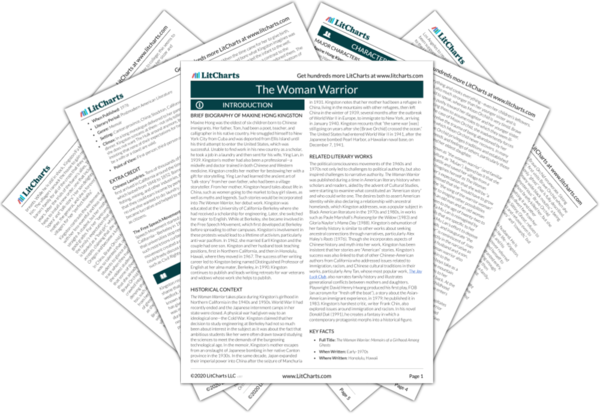Storytelling and Identity
As a memoir, The Woman Warrior is Maxine Hong Kingston’s effort to tell her own story. By telling her own story, though, Kingston mostly finds herself telling the stories of others—those in her family, those around her, and the myths of the Chinese and American cultures between which she is caught. She interweaves these personal stories, family stories, and myths so that they build on one another, both chronologically and thematically. Crucially, she also…
read analysis of Storytelling and IdentityGender Roles in Chinese Culture
Kingston characterizes traditional Chinese culture as having rigid gender rules that particularly limited women’s self-expression and did not value girls. Brave Orchid’s stories of buying girl slaves and midwifing reveal the brutality of life in China for girls and women who considered themselves fortunate if they were allowed to live beyond infancy (again, at least in Kingston’s portrayal). Through storytelling, Kingston imagines what it would be like if people in her ancestral country had…
read analysis of Gender Roles in Chinese CultureSilence vs. Speech
Kingston has an almost visceral fear of silence. Silence could make it seem as though someone had never existed, as in the case of No Name Woman. In some instances, the unwillingness to talk can lead to madness, as in the case of Kingston’s aunt, Moon Orchid. In Kingston’s characterization, Chinese people associate silence with weakness and insanity, and all of the evidence that Kingston sees in childhood strongly affirms this. The act…
read analysis of Silence vs. Speech
The Immigrant Experience
Kingston maintains a connection to “the old world” (China) primarily through her mother, Brave Orchid. Thus, Kingston develops a sense of China as both a real place and a mythical land. This tension is further highlighted by the fact that her family continue to obey the traditions and customs of the old world after immigrating to the United States, despite their lack of relevance in 1950s America. Her mother’s insistence that China is “home”…
read analysis of The Immigrant Experience






